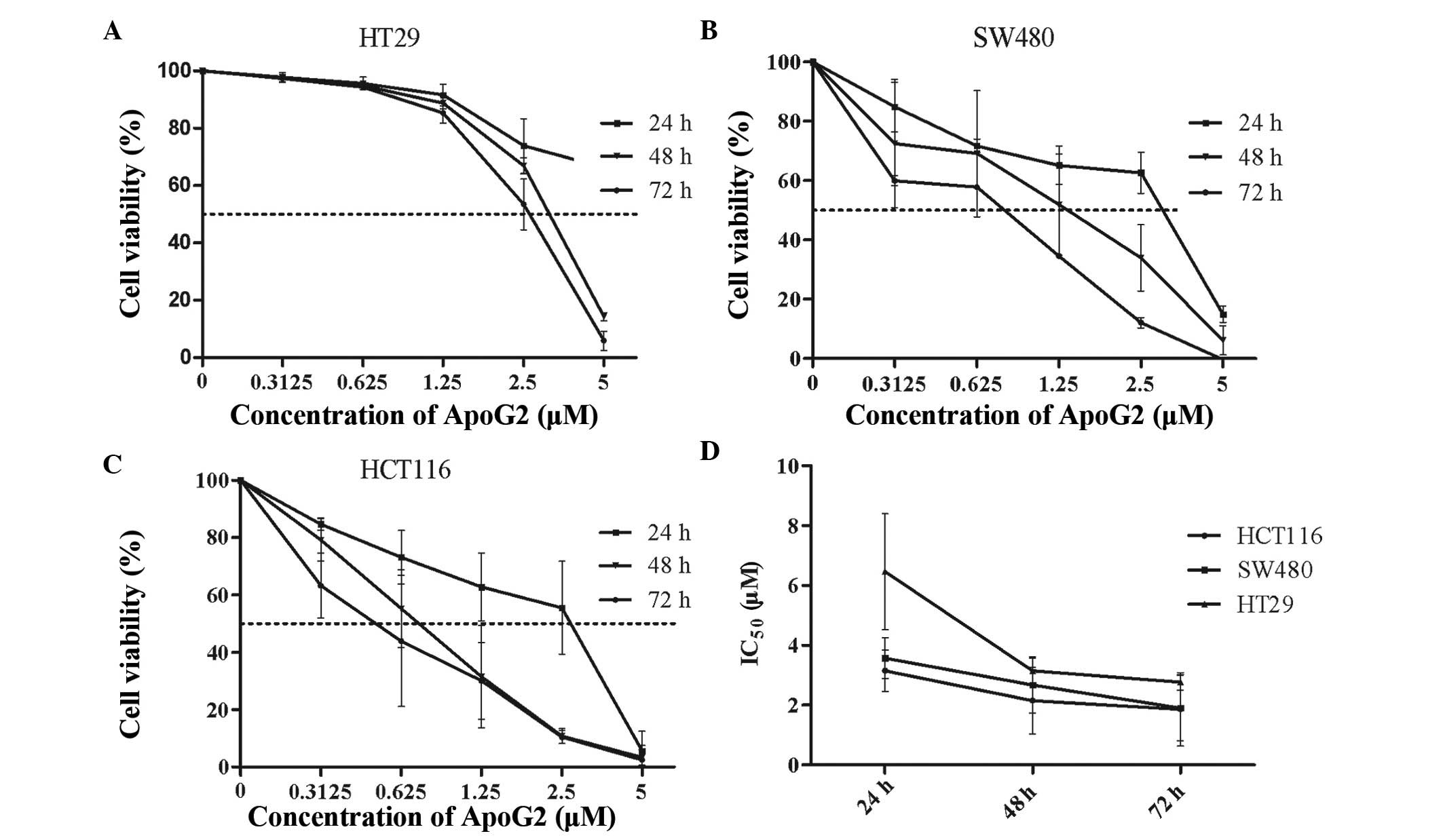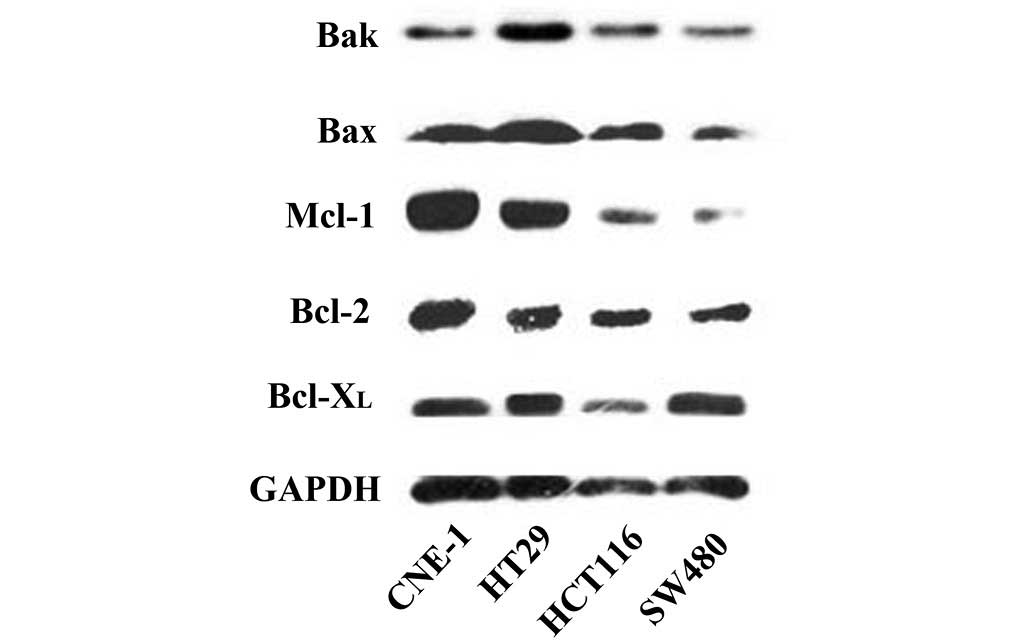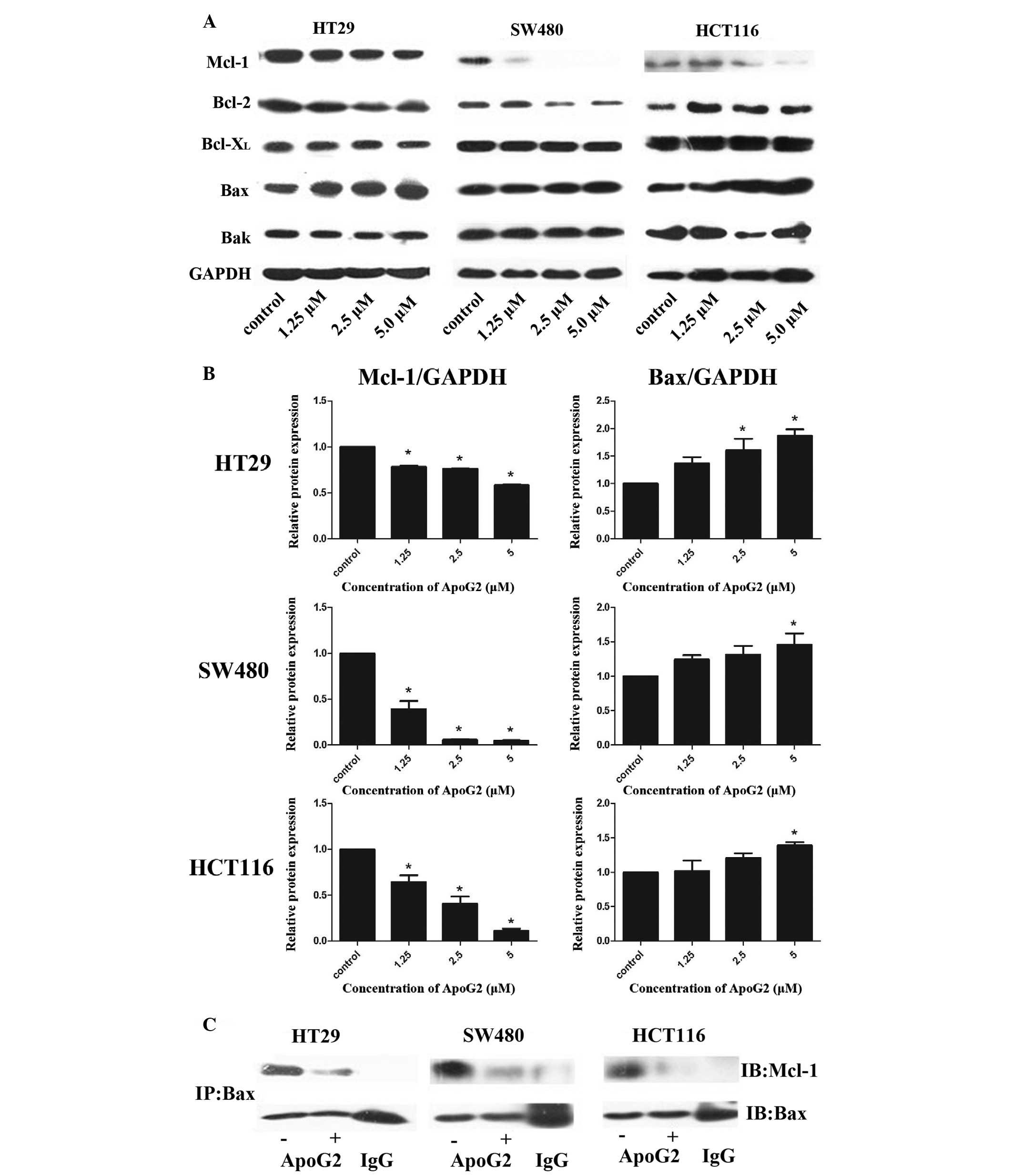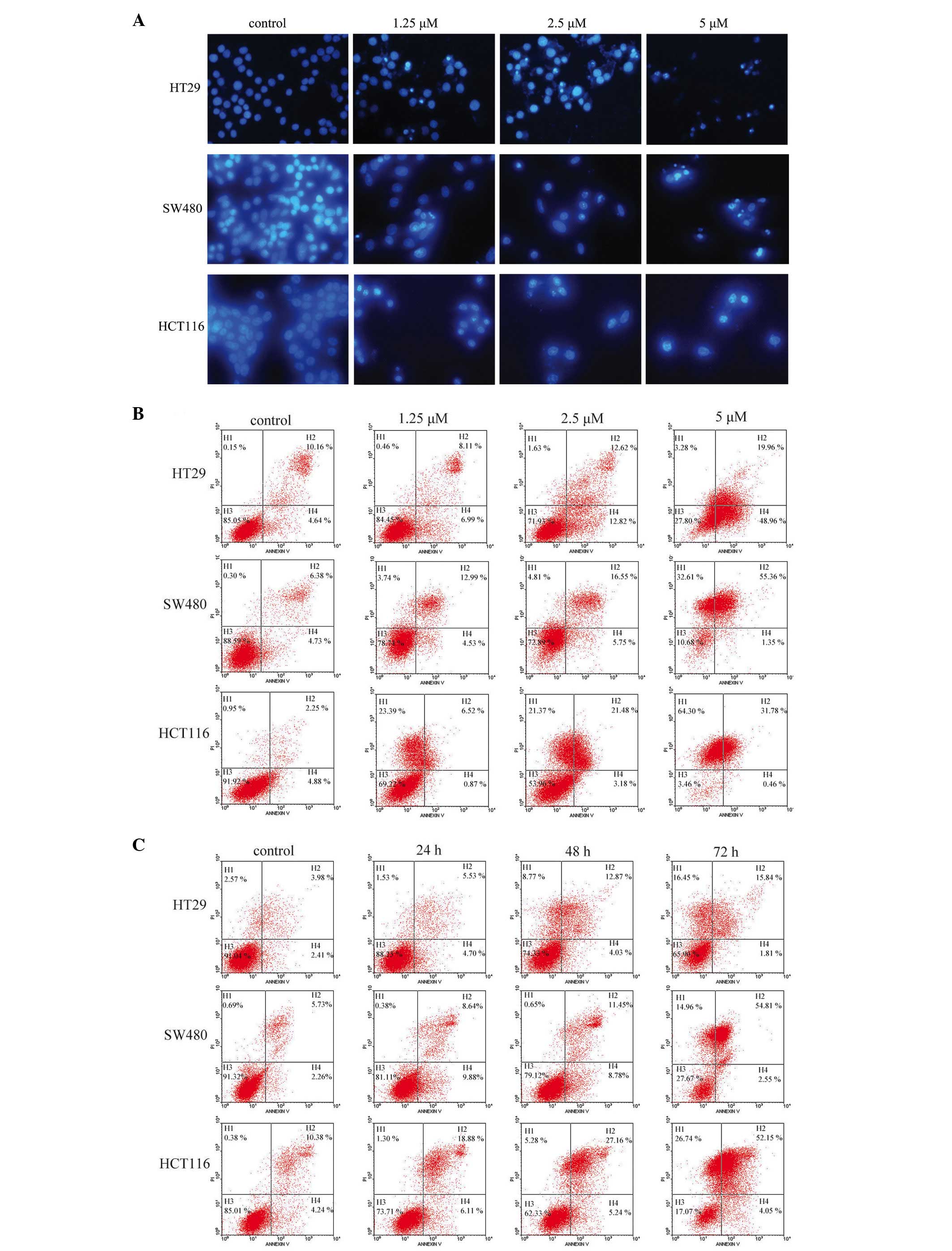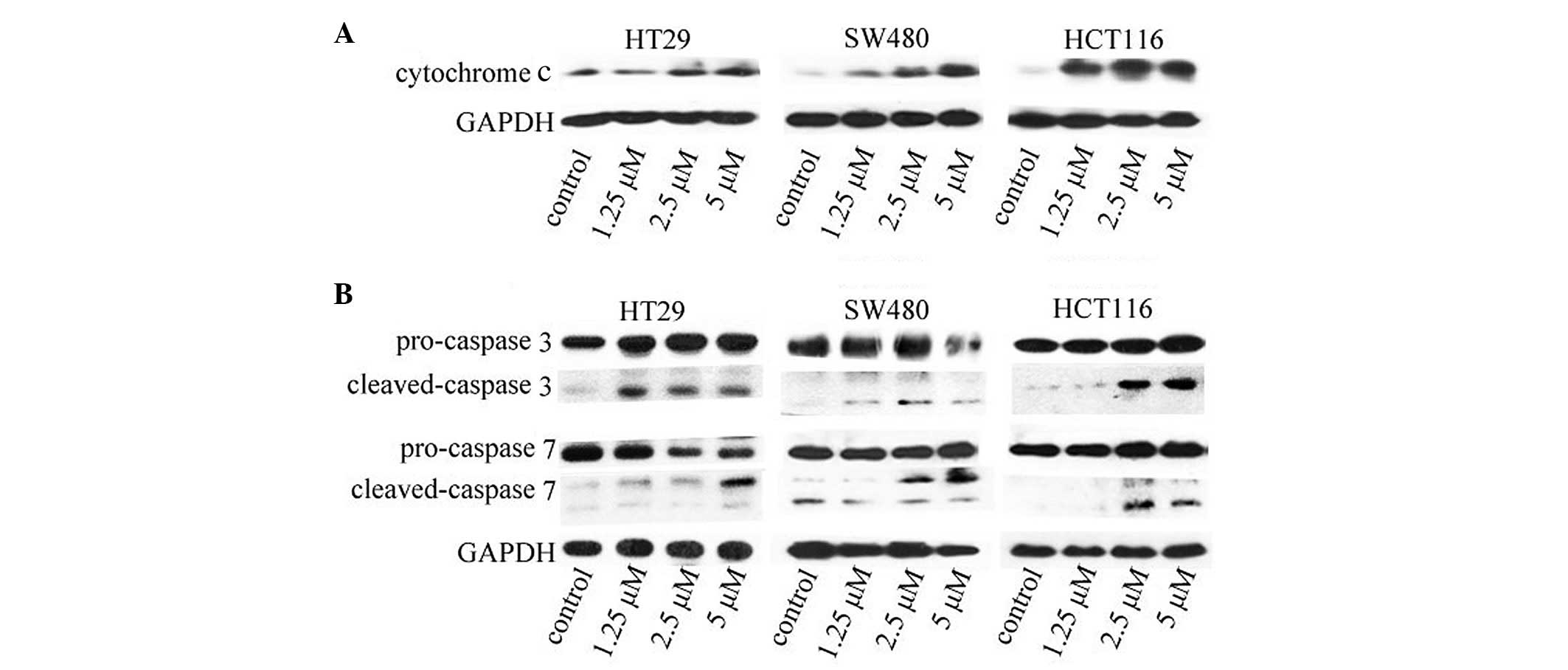|
1
|
Jemal A, Bray F, Center MM, Ferlay J, Ward
E and Forman D: Global cancer statistics. CA Cancer J Clin.
61:69–90. 2011. View Article : Google Scholar : PubMed/NCBI
|
|
2
|
André T, Boni C, Navarro M, Tabernero J,
Hickish T, Topham C, Bonetti A, Clingan P, Bridgewater J, Rivera F
and de Gramont A: Improved overall survival with oxaliplatin,
fluorouracil and leucovorin as adjuvant treatment in stage II or
III colon cancer in the MOSAIC trial. J Clin Oncol. 27:3109–3116.
2009. View Article : Google Scholar
|
|
3
|
Reed JC: Dysregulation of apoptosis in
cancer. Cancer J Sci Am. 4(Suppl 1): S8–S14. 1998.PubMed/NCBI
|
|
4
|
Adams JM and Cory S: The Bcl-2 protein
family: Arbiters of cell survival. Science. 281:1322–1326. 1998.
View Article : Google Scholar : PubMed/NCBI
|
|
5
|
Reed JC: Bcl-2 family proteins. Oncogene.
17:3225–3236. 1998. View Article : Google Scholar
|
|
6
|
Joensuu H, Pylkkanen L and Toikkanen S:
Bcl-2 protein expression and long-term survival in breast cancer.
Am J Pathol. 145:1191–1198. 1994.PubMed/NCBI
|
|
7
|
Sinicrope FA, Ruan SB, Cleary KR, Stephens
LC, Lee JJ and Levin B: Bcl-2 and p53 oncoprotein expression during
colorectal tumorigenesis. Cancer Res. 55:237–241. 1995.PubMed/NCBI
|
|
8
|
Ligueros M, Jeoung D, Tang B, Hochhauser
D, Reidenberg MM and Sonenberg M: Gossypol inhibition of mitosis,
cyclin D1 and Rb protein in human mammary cancer cells and
cyclin-D1 transfected human fibrosarcoma cells. Br J Cancer.
76:21–28. 1997. View Article : Google Scholar : PubMed/NCBI
|
|
9
|
Jiang J, Kulp SK, Sugimoto Y, Liu S and
Lin YC: The effects of gossypol on the invasiveness of MAT-LyLu
cells and MAT-LyLu cells from the metastasized lungs of
MAT-LyLu-bearing Copenhagen rats. Anticancer Res. 20:4591–4597.
2000.
|
|
10
|
Ready N, Karaseva NA, Orlov SV, Luft AV,
Popovych O, Holmlund JT, Wood BA and Leopold L: Double-blind,
placebo-controlled, randomized phase 2 study of the proapoptotic
agent AT-101 plus docetaxel, in second-line non-small cell lung
cancer. J Thorac Oncol. 6:781–785. 2011. View Article : Google Scholar : PubMed/NCBI
|
|
11
|
Sonpavde G, Matveev V, Burke JM, Caton JR,
Fleming MT, Hutson TE, Galsky MD, Berry WR, Karlov P, Holmlund JT,
et al: Randomized phase II trial of docetaxel plus prednisone in
combination with placebo or AT-101, an oral small molecule Bcl-2
family antagonist, as first-line therapy for metastatic
castration-resistant prostate cancer. Ann Oncol. 23:1803–1808.
2012. View Article : Google Scholar
|
|
12
|
Baggstrom MQ, Qi Y, Koczywas M, Argiris A,
Johnson EA, Millward MJ, Murphy SC, Erlichman C, Rudin CM, Govindan
R, et al: A phase II study of AT-101 (Gossypol) in
chemotherapy-sensitive recurrent extensive-stage small cell lung
cancer. J Thorac Oncol. 6:1757–1760. 2011. View Article : Google Scholar : PubMed/NCBI
|
|
13
|
Kitada S, Kress CL, Krajewska M, Jia L,
Pellecchia M and Reed JC: Bcl-2 antagonist apogossypol (NSC736630)
displays single-agent activity in Bcl-2-transgenic mice and has
superior efficacy with less toxicity compared with gossypol
(NSC19048). Blood. 111:3211–3219. 2008. View Article : Google Scholar : PubMed/NCBI
|
|
14
|
Hu ZY, Zhu XF, Zhong ZD, Sun J, Wang J,
Yang D and Zeng YX: ApoG2, a novel inhibitor of antiapoptotic Bcl-2
family proteins, induces apoptosis and suppresses tumor growth in
nasopha-ryngeal carcinoma xenografts. Int J Cancer. 123:2418–2429.
2008. View Article : Google Scholar : PubMed/NCBI
|
|
15
|
Niu X, Li S, Wei F, Huang J, Wu G, Xu L,
Xu D and Wang S: Apogossypolone induces autophagy and apoptosis in
breast cancer MCF-7 cells in vitro and in vivo. Breast Cancer.
21:223–230. 2014. View Article : Google Scholar
|
|
16
|
Xin J, Zhan Y, Liu M, Hu H, Xia L, Nie Y,
Wu K, Liang J and Tian J: ApoG2 induces ER stress-dependent
apoptosis in gastric cancer cells in vitro and its real-time
evaluation by bioluminescence imaging in vivo. Cancer Lett.
336:260–269. 2013. View Article : Google Scholar : PubMed/NCBI
|
|
17
|
Cheng P, Ni Z, Dai X, Wang B, Ding W, Rae
Smith A, Xu L, Wu D, He F and Lian J: The novel BH-3 mimetic
apogossypolone induces Beclin-1- and ROS-mediated autophagy in
human hepatocellular carcinoma [corrected] cells. Cell Death Dis.
4:e4892013. View Article : Google Scholar
|
|
18
|
Zhang X, Hu X, Mu S, Zhan Y, An Q, Liu Z
and Huang X: Apogossypolone inhibits the proliferation of LNCaP
cells in vitro and in vivo. Mol Med Rep. 10:1184–1194.
2014.PubMed/NCBI
|
|
19
|
Sun J, Li ZM, Hu ZY, Zeng ZL, Yang DJ and
Jiang WQ: Apogossypolone inhibits cell growth by inducing cell
cycle arrest in U937 cells. Oncol Rep. 22:193–198. 2009.PubMed/NCBI
|
|
20
|
Prabhudesai SG, Rekhraj S, Roberts G,
Darzi AW and Ziprin P: Apoptosis and chemo-resistance in colorectal
cancer. J Surg Oncol. 96:77–88. 2007. View Article : Google Scholar : PubMed/NCBI
|
|
21
|
Mi JX, Wang GF, Wang HB, Sun XQ, Ni XY,
Zhang XW, Tang JM and Yang DJ: Synergistic antitumoral activity and
induction of apoptosis by novel pan Bcl-2 proteins inhibitor
apogossypolone with adriamycin in human hepatocellular carcinoma.
Acta Pharmacol Sin. 29:1467–1477. 2008. View Article : Google Scholar : PubMed/NCBI
|
|
22
|
Sun Y, Wu J, Aboukameel A, Banerjee S,
Arnold AA, Chen J, Nikolovska-Coleska Z, Lin Y, Ling X, Yang D, et
al: Apogossypolone, a nonpeptidic small molecule inhibitor
targeting Bcl-2 family proteins, effectively inhibits growth of
diffuse large cell lymphoma cells in vitro and in vivo. Cancer Biol
Ther. 7:1418–1426. 2008. View Article : Google Scholar : PubMed/NCBI
|
|
23
|
Wang X, Wang J, Wong SC, Chow LS, Nicholls
JM, Wong YC, Liu Y, Kwong DL, Sham JS and Tsa SW: Cytotoxic effect
of gossypol on colon carcinoma cells. Life Sci. 67:2663–2671. 2000.
View Article : Google Scholar : PubMed/NCBI
|
|
24
|
Tuszynski GP and Cossu G: Differential
cytotoxic effect of gossypol on human melanoma, colon carcinoma and
other tissue culture cell lines. Cancer Res. 44:768–771.
1984.PubMed/NCBI
|
|
25
|
Lombardi L, Frigerio S, Collini P and
Pilotti S: Immunocytochemical and immunoelectron microscopical
analysis of BCL2 expression in thyroid oxyphilic tumors.
Ultrastruct Pathol. 21:33–39. 1997. View Article : Google Scholar : PubMed/NCBI
|
|
26
|
Wei J, Stebbins JL, Kitada S, Dash R, Zhai
D, Placzek WJ, Wu B, Rega MF, Zhang Z, Barile E, et al: An
optically pure apogossypolone derivative as potent pan-active
inhibitor of antiapoptotic bcl-2 family proteins. Front Oncol.
1:282011. View Article : Google Scholar
|
|
27
|
Weng C, Li Y, Xu D, Shi Y and Tang H:
Specific cleavage of Mcl-1 by caspase-3 in tumor necrosis
factor-related apoptosis-inducing ligand (TRAIL)-induced apoptosis
in Jurkat leukemia T cells. J Biol Chem. 280:10491–10500. 2005.
View Article : Google Scholar : PubMed/NCBI
|
|
28
|
Hernandez JM, Farma JM, Coppola D, Hakam
A, Fulp WJ, Chen DT, Siegel EM, Yeatman TJ and Shibata D:
Expression of the antiapoptotic protein survivin in colon cancer.
Clin Colorectal Cancer. 10:188–193. 2011. View Article : Google Scholar : PubMed/NCBI
|
|
29
|
Chen J, Chen Y and Chen Z: MiR-125a/b
regulates the activation of cancer stem cells in
paclitaxel-resistant colon cancer. Cancer Invest. 31:17–23. 2013.
View Article : Google Scholar : PubMed/NCBI
|
|
30
|
Poincloux L, Durando X, Seitz JF, Thivat
E, Bardou VJ, Giovannini MH, Parriaux D, Barriere N, Giovannini M,
Delpero JR and Monges G: Loss of Bcl-2 expression in colon cancer:
A prognostic factor for recurrence in stage II colon cancer. Surg
Oncol. 18:357–365. 2009. View Article : Google Scholar
|















